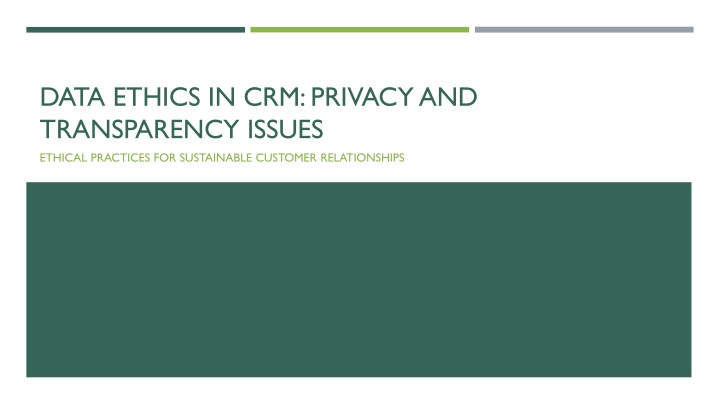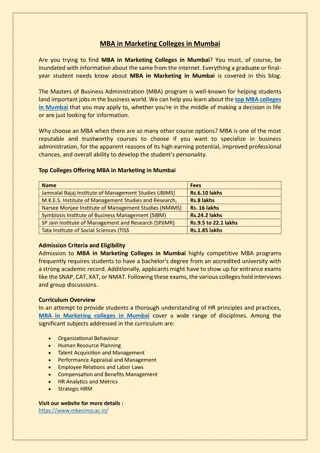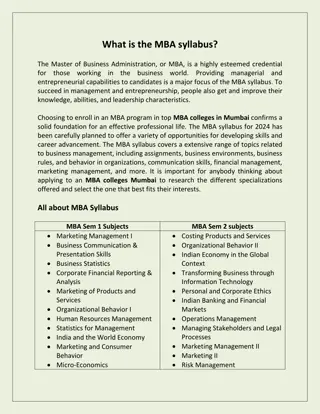
Ethical Data Management in CRM: Privacy, Transparency, and Best Practices
Explore the importance of ethical data management in Customer Relationship Management (CRM), focusing on privacy issues, transparency challenges, consequences of neglecting data ethics, and best practices for sustainable customer relationships. Learn about GDPR, CCPA, and key strategies to maintain trust and compliance in CRM systems.
Download Presentation

Please find below an Image/Link to download the presentation.
The content on the website is provided AS IS for your information and personal use only. It may not be sold, licensed, or shared on other websites without obtaining consent from the author. If you encounter any issues during the download, it is possible that the publisher has removed the file from their server.
You are allowed to download the files provided on this website for personal or commercial use, subject to the condition that they are used lawfully. All files are the property of their respective owners.
The content on the website is provided AS IS for your information and personal use only. It may not be sold, licensed, or shared on other websites without obtaining consent from the author.
E N D
Presentation Transcript
DATA ETHICS IN CRM: PRIVACY AND TRANSPARENCY ISSUES ETHICAL PRACTICES FOR SUSTAINABLE CUSTOMER RELATIONSHIPS
INTRODUCTION TO CRM AND DATA ETHICS What is CRM? Customer Relationship Management (CRM) is a system that collects, analyzes, and utilizes customer data to improve engagement and business strategies. Why Data Ethics Matters: Ethical use of CRM is essential to maintain trust, comply with legal standards, and ensure long-term success. Evolving CRM Challenges: From spreadsheets to AI-driven analytics, CRM systems have grown powerful, raising ethical concerns like privacy breaches and misuse of customer data.
PRIVACY ISSUES IN CRM Understanding Privacy in CRM: CRM systems store sensitive information like purchase history, behavioral patterns, and preferences. Managing this data ethically is a major responsibility. Key Privacy Concerns: 1. Unauthorized sharing of customer data. 2. Security breaches leading to exposure of personal information. 3. Over-collection of data beyond operational needs. Legal Frameworks: 1. GDPR (General Data Protection Regulation): Requires clear consent and data control mechanisms. 2. CCPA (California Consumer Privacy Act): Empowers customers with rights to access, delete, or restrict data usage.
TRANSPARENCY IN CRM Importance of Transparency: Customers need clear insights into data collection, usage, and sharing. 1. Transparent practices foster trust and loyalty. 2. Challenges in Achieving Transparency: Complexity of modern CRM systems. 1. Involvement of third-party vendors. 2. Keeping up with rapid technological changes. Transparency in Practice: 1. Data governance policies. 2. Publishing privacy reports and conducting audits. 3.
CONSEQUENCES OF NEGLECTING DATA ETHICS Loss of Customer Trust: 1. Data misuse leads to feelings of betrayal and reduced loyalty. 2. Customers shift to competitors with better ethical standards. Legal Repercussions: 1. Non-compliance with GDPR or CCPA can result in significant fines. 2. Examples: British Airways fined 20M for breaches. Financial Impacts: 1. Costs of breach mitigation, customer acquisition, and investor scrutiny. Reputational Damage: 1. Tarnished reputation affects partnerships, recruitment, and customer acquisition.
BEST PRACTICES FOR ETHICAL DATA MANAGEMENT Data Ethics Policy: 1. Purpose and scope of ethical guidelines. 2. Emphasis on consent, transparency, and data minimization. Employee Education: 1. Regular training on privacy and ethical data use. 2. Building a culture of trust and accountability. Customer Engagement: 1. Involving customers through transparency reports and privacy portals. Leveraging Technology: 1. AI-driven protection tools, consent management platforms, and blockchain.
FUTURE OF DATA ETHICS IN CRM Emerging Challenges: 1. Ethical implications of AI and machine learning in CRM. 2. Use of biometric and sensitive customer data. Opportunities for Ethical Leadership: 1. Proactively addressing biases and ensuring fairness. 2. Leveraging technologies like blockchain for data transparency. A Continuous Journey: 1. Ethical data practices as an ongoing effort to adapt to changing landscapes.
CONCLUSION AND KEY TAKEAWAYS Ethical CRM is essential for building trust and sustainable business relationships. Transparency and privacy protection are no longer optional they re business imperatives. Companies that prioritize data ethics will gain a competitive edge and ensure long- term success.





















